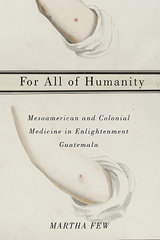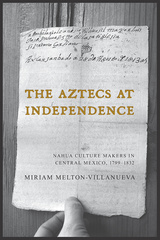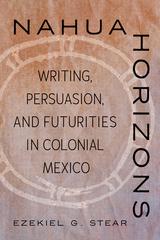
312 pages, 6 x 9
2 b&w illustrations, 9 color illustrations, 15 tables
Paperback
Release Date:27 Aug 2024
ISBN:9780816550227
Hardcover
Release Date:27 Aug 2024
ISBN:9780816553426
Healing Like Our Ancestors
The Nahua Tiçitl, Gender, and Settler Colonialism in Central Mexico, 1535–1660
The University of Arizona Press
Offering a provocative new perspective, Healing Like Our Ancestors examines sixteenth- and seventeenth-century Nahua healers in central Mexico and how their practices have been misconstrued and misunderstood in colonial records.
Early colonial Spanish settlers defined, assessed, and admonished Nahua titiçih (healing specialists) and tiçiyotl (healing knowledge) in the process of building a society in Mexico that mirrored Iberia. Nevertheless, Nahua survivance (intergenerational knowledge transfer) has allowed communities to heal like their ancestors through changes and adaptations. Edward Anthony Polanco draws from diverse colonial primary sources, largely in Spanish and Nahuatl (the Nahua ancestral language), to explore how Spanish settlers framed titiçih, their knowledge, and their practices within a Western complex. Polanco argues for the usage of Indigenous terms when discussing Indigenous concepts and arms the reader with the Nahuatl words to discuss central Mexican Nahua healing. In particular, this book emphasizes the importance of women as titiçih and highlights their work as creators and keepers of knowledge. These vital Nahua perspectives of healing—and how they differed from the settler narrative—will guide community members as well as scholars and students of the history of science, Latin America, and Indigenous studies.
Early colonial Spanish settlers defined, assessed, and admonished Nahua titiçih (healing specialists) and tiçiyotl (healing knowledge) in the process of building a society in Mexico that mirrored Iberia. Nevertheless, Nahua survivance (intergenerational knowledge transfer) has allowed communities to heal like their ancestors through changes and adaptations. Edward Anthony Polanco draws from diverse colonial primary sources, largely in Spanish and Nahuatl (the Nahua ancestral language), to explore how Spanish settlers framed titiçih, their knowledge, and their practices within a Western complex. Polanco argues for the usage of Indigenous terms when discussing Indigenous concepts and arms the reader with the Nahuatl words to discuss central Mexican Nahua healing. In particular, this book emphasizes the importance of women as titiçih and highlights their work as creators and keepers of knowledge. These vital Nahua perspectives of healing—and how they differed from the settler narrative—will guide community members as well as scholars and students of the history of science, Latin America, and Indigenous studies.
This book is not asking for your permission. It offers a compelling project—to describe, analyze, and defend Native Mesoamerican healing practices and to show how and why we should use original language to describe them. Based on close readings of Nahuatl language, Nahua cultural history, and Spanish ecclesiastical and judicial sources, this book challenges the reader to rethink tiçiyotl—Nahua healing medicine—from the original linguistic and epistemological viewpoint of those who developed it. Essential anticolonial reading.’—Martin Austin Nesvig, author of Promiscuous Power: An Unorthodox History of New Spain
'In this deeply researched study, Polanco decolonizes how we understand the work of the Nahua tiçitl, or healer, and the persecution of such healers at the hands of Spanish colonists. Seeking to Indigenize Nahua concepts that have long been misrepresented in the colonial record, he reconstructs a rich world of Nahua healing practices and beliefs about illness, the body, and the natural and supernatural, writing accessibly yet never shying away from complexity. By focusing especially on the roles of women healers and engaging scholarship in gender studies, Indigenous studies, Mesoamerican studies, ethnohistory, and the history of medicine, Polanco's work constitutes an important case study of Indigenous resilience in the face of settler colonialism in sixteenth and seventeenth-century Abya Yala.'—Adam Warren, University of Washington, author of Medicine and Politics in Colonial Peru: Population Growth and the Bourbon Reforms.
Edward Anthony Polanco is an assistant professor of history at Virginia Tech. Born in Los Angeles, California, he has ancestral roots in Kuskatan (western and central El Salvador). His research interests include Mesoamerica, Mexico, El Salvador, Indigenous sovereignty, Nahua peoples, and decolonization.











